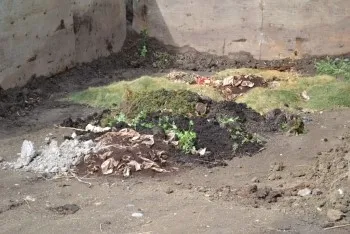Sustainability
Sustainability is a high priority for the department. From maintaining a compost pile for spring plantings to using irrigation to ensure water is not over used, Grounds implements the most environmentally friendly practices.
On-site greenhouse
The department’s top-of-the-line greenhouse is utilized throughout the year. Flowers and plants are seeded at the beginning of the year and grown in the greenhouse until they are ready to be planted in the spring. In the fall, perennial plants such as geraniums are harvested and maintained in the greenhouse over the winter for planting again in the spring. More than 8,000 plants were seeded in 2012.
“Grasscycling”
This is the term the Grounds department uses for its practice of leaving lawn clippings on the lawn to reduce the need for irrigation and fertilizer. Lawn mowers equipped with mulching decks cut and re-cut grass clippings before depositing them back onto the surface to decompose in place. The clippings are made up of roughly 85 per cent water and help shade the soil from the sun thus reducing irrigation. As the clippings naturally break down, they return nutrients to the soil reducing the need for supplemental fertilizers.
Irrigation
Located in a semi-arid climate, Lethbridge isn’t an ideal growing environment and many lands such as farms and parks require irrigation to maintain the area’s vegetation. The U of L is no exception. Generally, the campus grounds do not get enough moisture to sustain the trees, grasses and plants.
The University’s irrigation system is mostly automated which allows water to be applied evenly. Irrigation operations occur during the evening hours when evaporation losses are typically lower. However, Grounds staff may irrigate during a rain fall as it helps the moisture penetrate up to 150mm into the soil where it is most beneficial for both trees and grasses, and is not susceptible to evaporation loss.
While not everyone may understand this practice, irrigating during or after a rain fall also helps grasses develop a deep rooting system that aids in drought tolerance and weed infestation.
Our irrigation water is not taken from the treated supply of domestic water. The water is supplied untreated from Lethbridge Northern Irrigation District through canals and pipes after passing through Nicholas Sheran Lake


The University's active compost pile is used to replenish nutrients in new plantings.
Grounds Department sustainable practices include:
- An established cutting height of 75 mm in turf areas which helps conserve moisture and suppress weeds.
- Relocation rather than removal of campus trees whenever they are in the way of new construction.
- Replacing the fleet of lawn mowers with new technology that reduces fuel consumption by 25 per cent, resulting in lower costs and decreased carbon footprint.
- A non-idle policy for Grounds’ vehicles whenever it’s safe to do so thus reducing emissions and saving on fuel costs.
- Purchasing environmentally friendly and efficient, new vehicles and equipment while keeping all mechanical gear in top operating condition to ensure safety and efficiency.
- Collection of organic materials such as leaves, flower bed plantings, biology greenhouse soil, dying flowers or growing medium from the Grounds’ greenhouse to add to the University’s active compost pile which is then broken down and later used for its replenishing nutrients in new plantings.
- All materials collected from pruning activities are put through a chipper to use as mulch in planting beds to reduce weed pressures, conserve moisture and provide nutrients as they decompose back into the soil.
